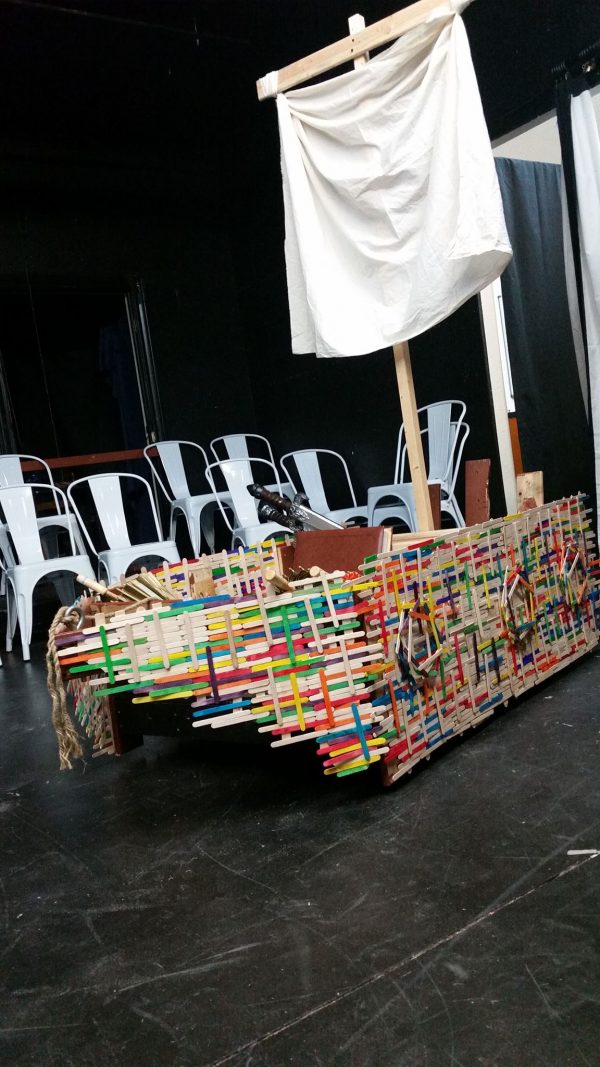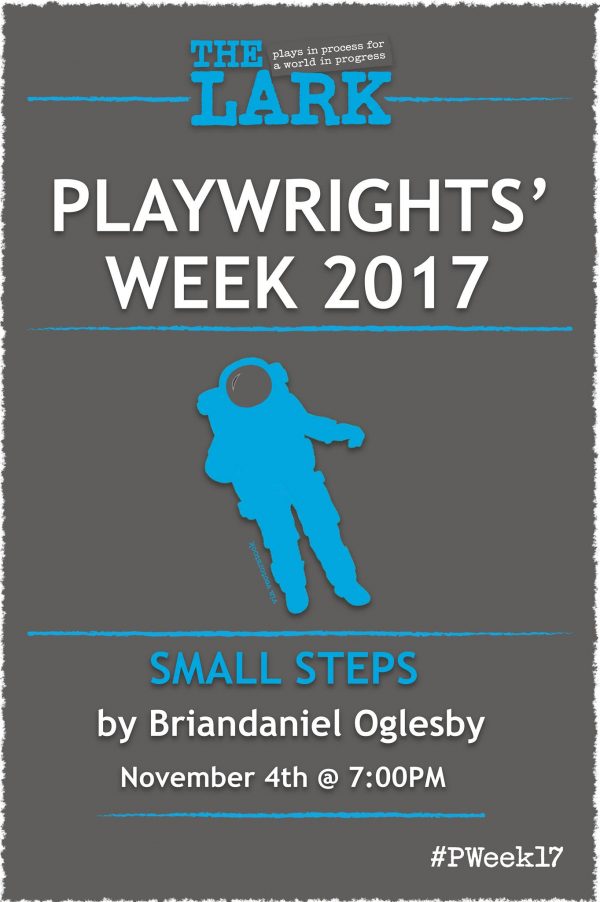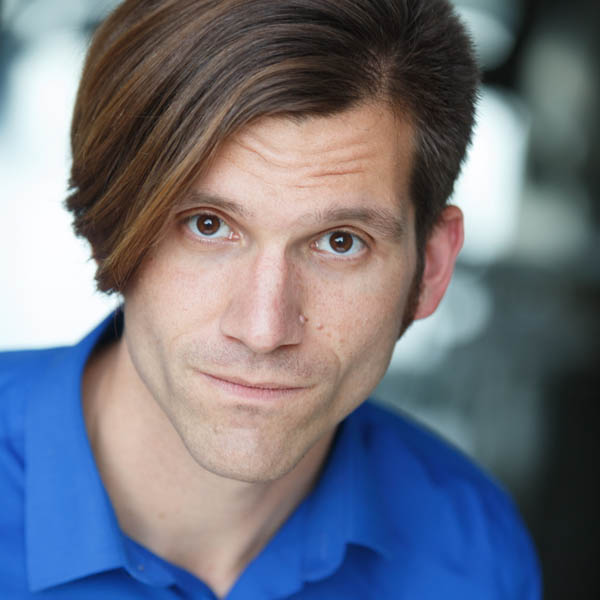I met Briandaniel a few weeks ago at the annual Playwrights Revolution – a staged reading of four plays that Sacamento’s Capital Stage puts on every summer.
Brian’s play “Basement Demons and Trailer Saints” stood out, not just because of the stellar cast of actors who put it on in less than a day, but for the fascinating writing and super-LGBTQ+ group of characters he’d created.
So afterwards I screwed up my courage and went to talk to him, hopeful that I could get him to do an interview for QSF (which I will also share on my own blog). It’s rare to find a play that speaks to both my love of sci fi/speculative fiction and that also has such a clear queer flavor.
To my delight, he agreed. So here it is – enjoy! And if you get a chance to catch one of his plays, take it.
J. Scott Coatsworth: Your play “Basement Demons and Trailer Saints” was fascinating, and had an amazingly diverse cast of mainly queer characters. Why don’t we start with you telling us a bit about the origins of that play, and the work you do with students that led to it?
Briandaniel Oglesby: So, after I got my MFA in Playwriting, I was hired to build a theatre department at a tiny, progressive private school. I thought I’d do this as my ‘day job,’ but I soon found that theatre for teens is a) a joyful space where I could create vibrant art that I believed in and b) overlooked by the vast majority of TheatreWorld. Most of the plays being produced in high school or junior high were written decades ago, and they simply do not reflect the identities of the people in the room. Hell, two of the big plays produced in high schools – She Kills Monsters and The Laramie Project – the gay characters at the center of the story are DEAD, and those are the rare plays written in the last twenty-ish years.

At times, you can find token gays here and there, but that’s about it. I’ve been developing techniques to create the plays with and for my students. While the buck stops with me – it’s my name on the play, and if there’s something offensive in the text, I’m to blame – I do bring them into the creative process and devise elements of every play with them.
Anyone who works with teenagers has likely noticed that LGBTQ+ youth are coming out younger and younger. This includes a handful of members of my theatre department. Many teens view gayness as a normal variation of the human experience. Many of my straight, cis kids have no qualms about portraying gay characters.
With Basement Demons, I had two actors who requested ‘gay’ parts, and so that element was imbedded into the script early on. As the play developed, it began to center around a group of unlikely friends – awkward strangers who become friends in Act 2. The sense of outsider-ness grew. In the end, we had a non-binary character, two lesbian-ish characters who fall for each other, and another character who’s coded as ‘possibly gay’ so he won’t come off as creepy. Of six roles, 3-4 of them are LGBT.
I then worked with a group of undergraduate students to make this play something that fits more for adult performers.
JSC: Have you ever written “regular” fiction, or has all your work been on the theater?
BdO: My first MFA was in Fiction. UC Riverside (Go Highlanders!). Playwriting was The Other Child for a long time. I wrote quasi-experimental short stories, but I got tired of chasing publication in lit journals – and networking is a struggle for me.
I realized my hard truth: there’s enough time in life to write both fiction and plays, but there isn’t enough time to make a career in both. I can only afford to go to so many conferences, I can only expend so much personal capital on networking and so much energy trying to find my way into a professional pipeline. It’s still my greatest struggle as a writer.
JSC: I get that. Cons aren’t cheap – believe me, I know. And I’m banging on my own doors, trying to break in.
How did you get started as a playwright?
BdO: I did theatre in high school. When I was a Freshman in college, I got a grant to transform a short story into a play script. I then worked with some high school friends to produce it in a barn. I was 20. This started a summer-based theatre company – Barnyard Theatre – which we shuttered just last summer. Many of these friends continue to be professional theatremakers, and so I think I was able to keep writing plays because I didn’t feel like I was alone.
JSC: Is all of your work queer inclusive? And have you ever had trouble as a queer man in the business?
BdO: It’s not all specifically queer inclusive, but I do think that it’s all ‘queer’ in the sense that my own subjective experience is not mainstream, and my work reflects this point of view. In that sense, it also reflects my mixed identity as half Latino, as well as the many privileges I have. Consider this: Oscar Wilde’s work is about straight people, but it’s also really really gay. So, I write about outsiders and underdogs. I write stories about people who are overlooked. While even straight people feel lonely at times, they are not abject.
Yes. I have had trouble being queer in this business. The fiction world has likely changed, but when I left it, my sense was that many of the lit-mags would limit themselves to publishing one gay story per issue, if that, while meditative stories about straight men deciding whether or not to cheat abounded. My work with LGBTQ characters for teens frequently runs into barriers; when I was approached by an online resource for theatre teachers who were on the hunt for scripts, they only inquired about my work without gay characters.
And my play about a gay man who volunteers to go to Mars recently lost out on a production to a play about a white middle class straight couple deciding on whether to have a second child, I presume because the theatre thought that one would bring in more of their audience. Sadly, they may have been right.
JSC: Keep at it. What you write is unique, and that’s the most precious quality in the creative world.
You mentioned you are working on a play that sounds like it’s right up my alley – queer sci fi. Tell us about it?
BdO: Small Steps is about Skip Powers. Sick of internet dating apps (“apps that help lonely people make mistakes”) he volunteers to go to Mars. And NASA says, “Sure, you’ll do.”

A lot of this play hinges on the character being gay, and lives in a campy, cartoonish-but-emotionally real reality. Dating is objectively harder for gay people, and so he is in the position to leave the planet. The metaphor is pretty blatant.
Sometimes Grindr makes you want to leave the planet.
It’s a play that my single gay friends get.
JSC: LOL… that’s a great tagline. I’d love to see it!
So, are there any repeating overriding themes in your work?
BdO: Yes. I’ve made mention of the lonely protagonist connecting – or disconnecting – that appears in much of my work. Lately, I’ve been most interested in using theatricality as metaphor to explore other elements of modern life. Basement Demons for example uses a literal demon cat-fishing someone.
JSC: It struck a nerve. Many of us are lonely or disconnected these days.
I saw that you worked on a gay version of Romeo and Juliet you were working on in 2016. How did that go? Did anything that happened surprise you?
BdO: When I’m dead and buried, that adaptation of RJ will probably be on my list of Top Ten Proudest Accomplishments. So, that had Romeo and Juliet as a gay couple, and we produced it with middle schoolers. The kids elected to do it. Artistically, that was huge. I loved my camp-tastic version of the script, and the kids who were in the production were amazing. They proved middle school students could make fantastic art.
BdO: I think what surprised me was that I could only get two of my own friends to see the show. Imagine that you’re putting together a wedding, and only two people show up because there’s, let’s say, a baseball game on TV. That’s what it felt like. I was gutted. How can I prove that theatre with middle schoolers can be art if no one shows up?
I think what was most surprising was experiencing the community of parents coming together to support the play.
JSC: That’s fantastic about the parents. But yeah, it can be hard to get friends to come out to support you. I’ve been mostly lucky in that respect, but last week we had a four author reading/panel and only seven people came.
Has your work helped any of your students in their own lives?
BdO: I’d like to think so. I’ve gotten many nice cards and emails from my students and their parents over the years. I’ve only been teaching for five years, so long term, we’ll see.
JSC: Where will your plays be performed next?
BdO: My as-yet-unwritten high school play will be produced in December.
JSC: Keep us in the loop. We’d love to hear from you again!
About BrianDaniel:
Briandaniel writes plays for teens and plays for mature audiences. He is a mixed-Latino LGBT playwright based out of Austin and from Sacramento. His play SMALL STEPS was developed at the JAW Festival and Playwrights’ Week at the Lark. His play HALFWAY, NEBRASKA was developed at Playwrights’ Week at the Lark, and went on to win the award for Outstanding Playwriting from the New York International Fringe Festival.
His SHE GET NAKED IN THE END received the Kennedy Center American College Theatre Festival Latinidad Award, and he is a three-time National Finalist for the festival for his short work.
He frequently develops his plays-for-teens with a group of teenagers, using devising techniques and kinesthetic dramaturgy. This includes the inventive adaptation of Grimms’ tales in THE TWELVE HUNTSMEN, adventure plays THE UNTITLED PIRATE PLAY and AND THEN, SHE PICKS UP THE SWORD, as well as a gay re-imagination of [a different] ROMEO & JULIET for middle schoolers he wrote and directed for his students. His adaptation of THE JUNGLE BOOK was commissioned and produced by Big Idea Theatre and published by Stage Rights.
For ten years, he was Literary Manager for Barnyard Theatre, a company he co-founded that produced new work in a historic dirt-floored barn.
He has an MFA in Creative Writing and Writing for the Performing Arts from the University of California at Riverside and a second MFA in Playwriting from the University of Texas at Austin.
For Adults: https://briandanieloglesby.com/theatre/small-steps/
Teen Theatre 1 – https://briandanieloglesby.com/plays-for-teens/and-then-she-picks-up-the-sword/
Teen Theatre 2: https://briandanieloglesby.com/plays-for-teens/space-carl-or-how-to-get-lost-on-planet-venus/
Essays: https://howlround.com/making-queer-theatre-young-peoplein-texas



